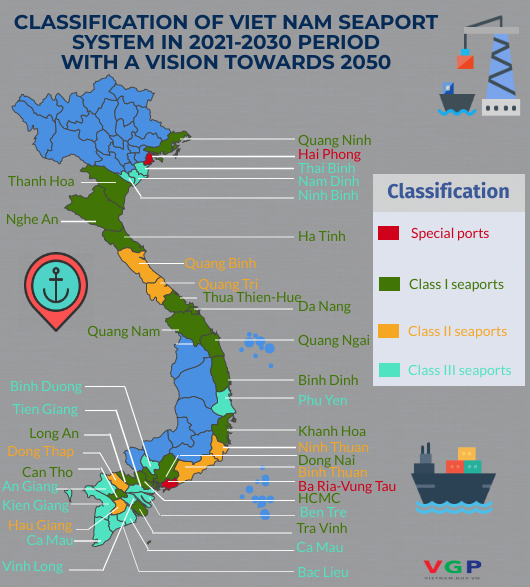New master scheme on seaport system approved
VGP – Deputy Prime Minister Le Van Thanh signed Decision 1579/QD-TTg, approving the master plan on development of Viet Nam’s seaport system in the 2021-2030 period, with a vision towards 2050.
By 2030, the plan targets to build a seaport system in a synchronous and modern manner, offering good quality services in favor of socio-economic development, national defense, security, maritime safety, and environmental protection.
The volume of goods through the seaport system will reach 1,140 to 1,423 million tons (including 38 to 47 million twenty-foot equivalent units (TEUs) worth of containerized goods). The plan aims to transport 10.2 to 10.3 million passengers.
The plan prioritizes investment in international ports namely Lach Huyen (in Hai Phong city), Cai Mep (Bai Ria-Vung tau province), Van Phong (Khan Hoa) and develop Tran De port (in Soc Trang province) for the Mekong Delta region.
Specifically, the system comprises five groups of 36 seaports including:
Group 1 comprises five seaports includes Hai Phong, Quang Ninh, Thai Binh, Nam Dinh, and Ninh Binh seaports.
By 2030, the group 1 will handle 305 to 367 million tons (including 11 to 15 million TEUs worth of containerized goods) and 162,000 to 164,000 passengers.
Group 2 covers six seaports namely Thanh Hoa, Nghe An, Ha Tinh, Quang Binh, Quang Tri, and Thua Thien Hue.
By 2030, the group 2 will handle 172 to 255 million tons (including 0.6 to 5 million TEUs worth of containerized goods) and 202,000 to 164,000 passengers.
Group 3 includes eight seaports namely Da Nang, Quang Nam, Quang Ngai, Binh DInh, Phu Yen, Khoa Hoa, Ninh Thuan and Binh
By 2030, the group 3 will handle 138 to 181 million tons (including 1.8 to 2.5 million TEUs worth of containerized goods) and 1.9-2 million passengers.
Group 4 consists of five seaports including HCMC, Dong Nai, Ba Ria-Vung Tau, Binh Duong, and Long An.
By 2030, the group 4 will handle 461 to 540 million tons (including 23 to 28 million TEUs worth of containerized goods) and 1.7-1.8 million passengers.
Group 5 comprises 12 seaports namely Can Tho, Dong Thap, Tien Giang, Vinh Long, Ben Tre, An Giang, Hau Giang, Soc Trang, Tra Vinh, Ca Mau, Bac Lieu, and Kien Giang.
By 2030, the group 5 will handle 64 to 80 million tons (including 0.6 to 0.8 million TEUs worth of containerized goods) and 6.1-6.2 million passengers.
The plan categorizes the seaport system into four types in terms of scale and function.
Hai Phong and Ba Ria-Vung Tau seaports are special ones.
The rest of seaports include Class I seaports (15), Class II seaports (six), Class III seaports (13).
By 2030, Viet Nam needs to seek about VND 313 trillion (US$ 12.8 billion) to modernize the seaport system.
 |
By Huong Giang

